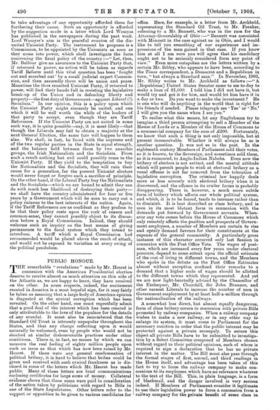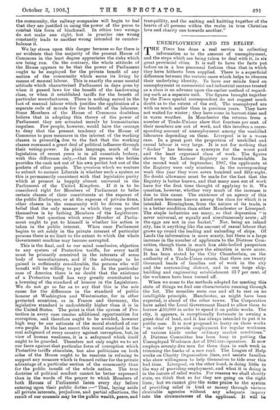PUBLIC HONOUR. T HE remarkable "revelations " made by Mr. Hearst
in connexion with the American Presidential election deserve to receive almost as much attention on this side of the Atlantic as, we are happy to learn, they have received on the other. In some respects, indeed, the excitement created in America is a most hopeful sign, for it may fairly be taken as meaning that a large body of American opinion is disgusted at the cynical corruption which has been revealed. On the other hand, one must regretfully admit that a good deal of the interest which has been created is only attributable to the love of the populace for the details of any scandal. It must also be remembered that the Standard Oil Trust is intensely unpopular throughout the States, and that any charge reflecting upon it would naturally be welcomed, even by people who would not be shocked at similar dishonourable practices under other conditions. There is, in fact, no means by which we can measure the real feeling of eighty million people upon such an issue as that which has now been raised by Mr. Hearst. If there were any general condemnation of political bribery, it is hard to believe that bribes could be given and received with such cynical frankness as is dis- closed in some of the letters which Mr. Hearst has tnade public. Many of these letters are brief communications enclosing certificates for large sums of money. Collateral evidenoe shows that these sums were paid in consideration of the action taken by politicians with regard to Bills in one of the State Legislatures. Other letters refer to the support or opposition to be given to various candidates for office. Here, for example, is a letter from Mr. Archbold,. representing the Standard Oil Trust, to Mr. Foraker, , referring to a Mr. Bennett, who was in the race, for the Attorney-Generalship of Ohio :—" Bennett was associated with Mounett in the case against us in Ohio, and I would like to tell you something of our experiences and im- pressions of the man gained in that case. If you know him at all I am sure you will agree that his candidacy ought not to be seriously considered from any point of view." Even more outspoken are the letters written by a certain Mr, Sibley, who appears to have been, according to the Times correspondent, a Democrat and a Republican in turn, " but always a Standard man." In November, 1903, Mr. Sibley writes to Mr. Archbold as follows :—" A [Republican] United States Senator came to me to-day to make a loan of $1,000. I told him I did not have it, but would try and get it for him, and would let him have it in a day or two. Do you want to make the investment ? He is one who will do anything in the world that is right for his friends if needed. Please telegraph me Yes' or ' No.' I will give you the name when I see you."
To realise what this means, let any Englishman try to imagine a third person attempting to sell a Member of the House of Lords or a Member of the House of Commons to a commercial company for the sum of £200. Fortunately, we know that such a thing is not only impossible, but at present inconceivable. Whether it will always be so is another question. It was not so in the past. In the eighteenth century Members of Parliament sold their votes, so it is known, to the Sovereign, and sometimes sold them, so it is rumoured, to Anglo-Indian Nabobs. Even now the bribery of electors is not extinct, and the mental attitude which will permit people to wink at electoral bribery as a venal offence is not far removed from the toleration of legislative corruption. The criminal law happily deals more or less severely with electoral bribery when it is discovered, and the offence in its cruder forms is probably disappearing. There is, however, a. much more subtle form of bribery which affects our whole political system, and which, it is to be feared, tends to inorease rather than to diminish. It is best described as class bribery, and is seen in its most blatant form in connexion with the demands put forward by Government servants. When- ever any vote comes before the House of Commons which only remotely affects the position and prospects of Govern- ment employees, a number of Members are certain to rise and openly demand favours for their constituents at the expense of the general community. A particularly gross instance of this character occurred only last Session in connexion with the Post Office Vote. The wages of post- men, which are increased every few years under electoral pressure, depend to some extent upon the official estimate of the cost of living in different towns, and the Members who spoke in the debate on the Post Office Estimates almost without exception confined their remarks to a demand that a higher scale of wages should be allotted to the different towns which they represented. And yet we are now light-heartedly advised by the Chancellor of the Exchequer, Mr. Churchill, Sir John Brunner, and other earnest Liberals to increase the number of men in Government employment by at least half-a-million through the nationalisation of the railways.
A somewhat less direct, but almost equally dangerous, form of class bribery occurs in connexion with private Bills promoted by railway companies. When a railway company wishes to make a new railway, or in any other way to enlarge its system, it must come to Parliament for the necessary sanction in order that the public interest may be protected against a private monopoly. To secure this object all private Bills have to be submitted to investiga- tion by a Select Committee composed of Members chosen without regard to their political opinions, each of whom is required to sign a declaration that he has no private interest in the matter. The Bill must also pass through the formal stages of first, second, and third readings in the House itself, and advantage has been taken of this fact to try to force the railway company to make con- cessions to its employees which have no relevance whatever to the text of the Bill. This, in plain language, is a form of blackmail, and the danger involved is very serious indeed. If Members of Parliament consider it legitimate to use their legislative power to force a concession from a. railway company for the private benefit of some class in the community, the railway companies will begin to feel that they are justified in using the power of the purse to combat this form of blackmail. In ethics two wrongs do not make one right, but in practice one wrong constantly leads to another wrong intended to counter- balance it.
We lay stress upon this danger because so far there is no' evidence that the majority of the present House of Commons in the least degree appreciates the risks which are being run. On the contrary, the whole attitude of the House appears to be that the power of Parliament ought to be employed for the private benefit of any section of the community which earns its living by means of manual labour. This is exactly the same mental attitude which characterised Parliament in days gone by when it passed laws for the benefit of the landowning class, or when it established tariffs for the benefit of particular manufacturers. There is nothing sacred in the fact of manual labour which justifies the application of a separate code of morals for the benefit of the labourer. Some Members of the House of Commons doubtless believe that in adopting this theory of the power of Parliament they are actuated merely by humanitarian impulses. Few people, however, would have the courage to deny that the present tendency of the House of Commons to pass measures in the interest of the working classes is primarily, due to the fact that the working classes command a great deal of political influence through their voting-power. In plain language, much of the legislation of recent years is in all essentials bribery, with this difference only,—that the person who bribes provides the cash not out of his own pocket but out of the pockets of other people. The question which we venture to submit to earnest Liberals is whether such a system as this is permanently consistent with that legislative purity which at present is happily almost universal in the Parliament of the United Kingdom. If it is to be considered right for Members of Parliament to bribe certain classes of their constituents at the expense of the public Exchequer, or at the expense of private firms, other classes in the community will be driven to the belief that the only manner in which they can protect themselves is by bribing Members of the Legislature. The real test question which every Member of Parlia- ment ought to put to himself is whether his action is taken in the public interest. When once Parliament begins to act solely in the private interest of particular persons there is no limit to the extent to which the whole Government machine may become corrupted.
This is the final, and to our mind conclusive, objection to any system of Protective tariffs, for every tariff must be primarily conceived in the interests of some body of manufacturers, and if the advantage to be gained is sufficiently considerable, the persons who will benefit will be willing to pay for it. In the particular case of America there is no doubt that the existence of a Protective tariff has very greatly contributed to a lowering of the standard of honour in the Legislature. We do not go so far as to say that this is the sole cause for the difference in the standard of public honour at Washington and Westminster, for in other protected countries, as in France and Germany, the legislative standard is undoubtedly higher than it is in the United States. The point is that the system of Pro- tection in every case creates additional opportunities for corruption, and therefore ought to be avoided, however high may be our estimate of the moral standard of our own people. In the last resort this moral standard is the real safeguard of every country against corruption, but, in view of human weakness, it is a safeguard which itself ought to be guarded. Therefore not only ought we to set our faces against that particular form of corruption which Protective tariffs stimulate, but also politicians on both sides of the House ought to be resolute in refusing to support any measure which is framed rather for the private advantage of a, particular section of the community than for the public benefit of the whole nation. The true doctrine of political conduct cannot be better expressed than in the words of the prayer to which Members of both Houses of Parliament listen every day before entering upon their public duties :--" That, laying aside all private interests, prejudices, and partial affections, the result of our counsels may be the public wealth, peace, and tranquillity, and the uniting and knitting together of the hearts of. all persons within the realm in true Christian love and charity one towards another,"

























































 Previous page
Previous page